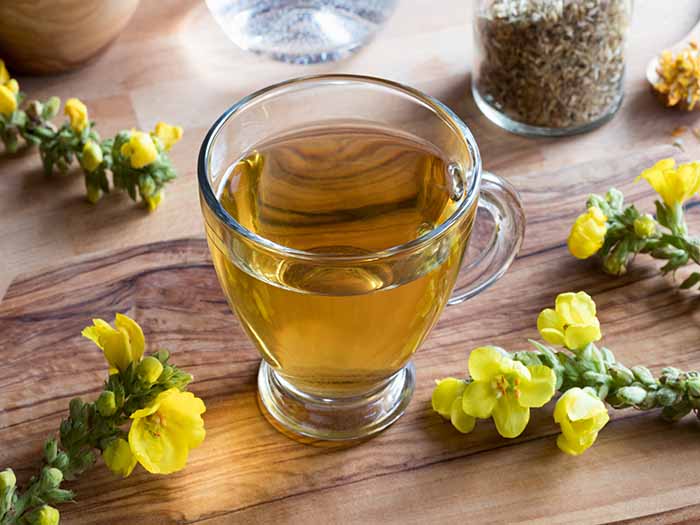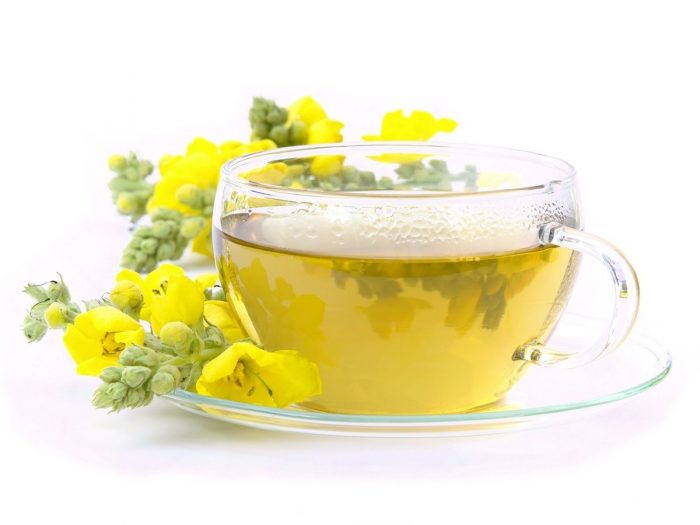Brewing a cup of mullein tea can be an excellent way to promote good respiratory health, among a number of other potential health benefits.
What is Mullein Tea?
Mullein tea is a traditional brew that is made by steeping the fresh or dried leaves and flowers of the mullein plant in hot water. The most common type of mullein plant is taxonomically known as Verbascum thapsus, although the Verbascum genus contains more than 250 different species of mullein. This plant is considered an invasive species in many parts of the world, although it originated in Europe and parts of Asia. Brewing a tea from this plant is the most common use, primarily due to the amount of mucilage present in the leaves, which creates a coating on the throat. [1] [2]
Mullein tea has a rather distinct taste, although it is a mild, aromatic flavor with a small aftertaste of spice. When combined with other brews, spices or natural sweeteners, it takes on a pleasant and very drinkable quality. There is no natural caffeine in the mullein plant, so unlike many other types of tea, this variety is good for those who want to cut down on caffeine.
Mullein Tea Nutrition Facts
This tea has good concentrations of flavonoids, tannins, terpenoids, glycosides, and saponins, all of which can have notable antioxidant effects on the body. There is also a good amount of mucilage – a specialized polysaccharide substance – in this tea, which provides the anti-inflammatory coating on the throat. [3]

Mullein tea is a flavorful beverage that is used to treat a number of ailments. Photo Credit: Shutterstock
How to Make Mullein Tea?
If you want to make your own mullein tea, you will need either fresh or dried mullein leaves and flowers. If you have fresh leaves and flowers, lay them on a cookie sheet and cover them with cheesecloth. Be sure they are not exposed to moisture for 2-3 days until they are completely dry; then, you are ready to brew some tea. Making tea with fresh mullein leaves is also possible, but will require more steeping time. Take a look at the recipe below.

Lung-Healing Mullein Tea Recipe
Ingredients
- 1-2 tsp of dried mullein leaves of flowers
- 2 cups of boiling water
- 1 tsp of honey or any other sweetener of your choice (optional)
Instructions
- To make mullein tea, bring 2 cups of water to a boil in a saucepan.
- Pour hot water over 2 teaspoons of dried mullein leaves, as well as 2-3 dried flowers.
- Allow the tea to steep for 8-10 minutes.
- Strain the tea through cheesecloth to remove any leaves or flower particles.
- Add honey, if desired, to improve the flavor of the tea.

Mullein Tea Benefits
There are many different health benefits from mullein tea, which may include its effects on respiratory ailments, skin conditions, joint pain, asthma, eye infections, hormone balance, and even headaches. Many of these conditions are the result of inflammation, which the active ingredients in this tea are known to counteract. The antioxidants that are known to be present in this tea can help to boost the immune system, while also possibly prevent the sort of chronic inflammation that leads to oxidative stress. In terms of the effects it can have on your body’s hormone levels, it can help to eliminate many of the symptoms of an underactive thyroid gland. [4]
The effects that this tea has on the immune system means that you are protected against bacterial and viral infections, not to mention gastrointestinal conditions, such as diarrhea, constipation, and hemorrhoids. Overall, this tea is a tonic for the entire body, provided that it is consumed in moderation. In some cases, the leaves of the mullein plant can even be smoked, a remedy commonly known to help respiratory ailments and inflammation. [5]
Mullein Tea Side Effects
There are some unwanted side effects of this plant, however, particularly if you consume this tea in excess. These side effects include bleeding problems, as well as skin irritation and respiratory distress if you happen to have an allergic sensitivity to this plant. Topical dermatitis can also occur in some people. Generally, this tea is not recommended for pregnant women, or for those who are breastfeeding. As with many health remedies, be sure to speak with your doctor before adding mullein tea to your health routine. [6]

